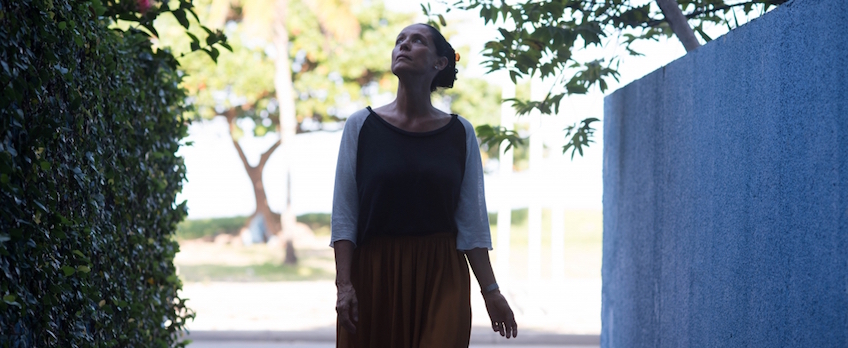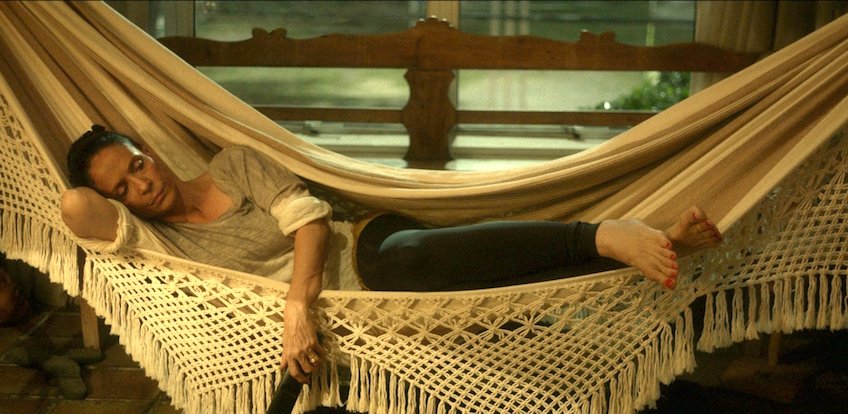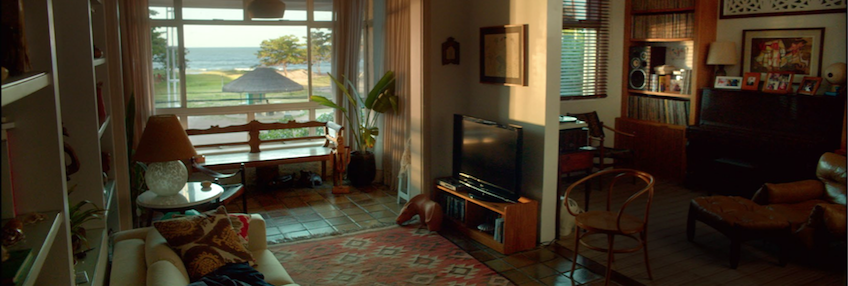Aquarius, Four Ways

During Critics Campus 2016 our critics took part in a live-editing workshop. Four of them reviewed Kleber Mendonça Filho's latest feature, Aquarius, and then edited their drafts with David Jenkins, editor of Little White Lies. Read their final reviews below – and don’t forget to check out all of our Critics Campus coverage.
Review by Aimee Knight
Aquarius is the tits, both figuratively and literally. Brazilian director Kleber Mendonça Filho showcases mastectomy, breast-feeding, and the non-sexualised mammaries you don’t see in Miami. In seaside Recife, he explores class, gender and entitlement, showing how property and possessions define social standing – and, therefore, the self.
In the affluent neighbourhood of Boa Viagem, retired rock journalist Clara (Sônia Braga) is the last remaining resident of beachfront apartment block the Aquarius. She spends the sun-soaked days of her autumnal years on the sand, in the surf, and struggling with Diego (Humberto Carrão), heir to a corrupt construction company that is itching to bulldoze her building.
An opening prologue of black-and-white photos shows 1960s Recife becoming a go-to holiday destination. In the present day, it’s a city divided by privilege, with a line drawn in the sand by sewage run-off. This line separates the upper and lower classes, as Clara explains en route to her maid’s birthday party.
With a timeframe spanning three generations of women, Aquarius is a slow, scintillating burn. The expansive CinemaScope ratio accommodates both the building’s wide façade and the length of a luxurious hammock. Conversely, it also captures Clara from head to torso, emphasising her strong, functional, sensual – yet non-sexualised – body. Though Clara conquered cancer in the 1970s, a sense of unrest pervades Aquarius, punctuated by staccato cuts to past events, real and imagined.
Clara’s apartment brims with treasured possessions: her stereo, piano, grand-aunt Lucia’s dresser. The production design by Juliano Dornelles and Thales Junqueira is loaded with memory and meaning, where objects are grout for emotional cracks. Living as a widow, Clara clings to her apartment, her independence, and her privilege, drawn out in a complex performance by Braga.
A music critic in a previous life, Clara makes herself heard in male-dominated spaces (while relying on the domestic labour of female hired help to maintain her lifestyle). She listens to the same albums she played in 1980, and hits the town with her girlfriends, feeling at once like “an old lady and a child,” as she tells her daughter. She’s affectionate and tactile, but restless about the flesh that was taken from her. Despite her anxieties, Clara doesn’t acquiesce to the planned obsolescence reserved for women ‘of a certain age’ once society deems them unfuckable.

Review by Tanya Farley
In Brazil, they don’t always sing Happy Birthday – but that’s not all that Kleber Mendonça Filho reveals about his homeland and its people in Aquarius.
The follow-up to the filmmaker’s feature debut, Neighboring Sounds (MIFF 12), Aquarius is a treatise on progress, growing older, and moving on. Or, for 65-year-old former music critic Clara (Sônia Braga), holding on, as a developer seeks to buy her out of her beachfront digs in the building that grants the film its name. Progress has arrived in the neighbourhood of Boa Viagem in Recife, Brazil, but Clara refuses to budge as neighbours make bank and move out, and concrete monoliths charge up across the suburb.
Told in three chapters, Aquarius begins in the 80s as Clara, a mother in remission from breast cancer, celebrates the birthday of a beloved grand-aunt, who lives in the apartment Clara will go on to inherit and raise her family, lose her husband and begin her golden years in. Flash forward three decades and, like the prized LP collection Clara has amassed over time, the Art Deco Aquarius building is a relic of a bygone era. While her children, friends, and family have accepted that the Aquarius has seen better days, Clara tells the upstart, US-schooled developer Diego (Humberto Carrão) that death is the only force that will move her out.
Braga infuses the character with grace and pluckiness, firmly placing herself alongside the likes of Helen Mirren, Catherine Deneuve and Charlotte Rampling: actors who bring characters to life that prove that women don’t simply disappear once they hit 40. While Clara is calm and unflinching on screen, the tension builds in Clara’s inescapable awareness that even her haughty comebacks won’t stop the bulldozers.
Mendonça Filho grew up in Recife, and Aquarius continues his exploration into the local community. While Neighboring Sounds followed upper-crust residents further up the beach, Aquarius is no less biting in its commentary on social hierarchy. Both subtle and searing, Aquarius could easily be viewed through a feminist lens but there is much more at play: Clara’s story is both an ode to Mendonça Filho’s Brazil as it moves towards the future and a universal comment on the price of progress.
And the birthday tune, as sung by Clara? As well as good wishes, this version also hopes your home will be a shelter from the storm. Of all of Clara’s classic tracks that play throughout Aquarius, it’s this one that rings loudest.

Review by Isabella McNeill
Brazil, home to beautiful beaches and a hotbed of insidious corruption, appears at the forefront of Aquarius, a tale of corporate greed and national cronyism by critic-turned-filmmaker Kleber Mendonça Filho. It centres on Clara (veteran actress Sônia Braga), a widowed and retired music journalist, whose apartment block, a 1940s building called Aquarius, is being targeted by a property developer keen to line the beachfront with luxury condos. Her neighbours have taken the offer from developers and moved on; Clara is the building’s final holdout.
As a result, she must endure a menacing campaign of intimidation fronted by the grandson of the firm’s owner – a creepily plausible, handsome, smooth-talking youngster named Diego (Humberto Carrão). In many respects, Clara’s building is a metaphor for Brazil itself, with its nepotism, corruption, and cynicism countered by the warmth of Clara’s effervescent community.
The film effortlessly transitions from breathtaking exteriors to intimate interiors, and makes good use of music’s powerful capacity to conjure mood and memory. In one terrific scene, while a rowdy party-cum-porn-production that Diego has arranged in the apartment above her takes place, Clara puts on Queen’s Fat Bottomed Girls at full volume. For a brief moment, she retakes ownership of her space.
Amplified by the rich, multifaceted role – something unfortunately so uncommon in cinema – Braga’s performance is the film’s strongest asset. The camera rarely leaves her, and the whole-heartedness with which she approaches Clara’s nuances is palpable. Clara is fiercely self-aware and frank in her dislike for Brazilian politics and her love of the Brazilian way of life. While the world around her begins to crumble apart, Clara repeatedly reaffirms the passions that helped her build it.
Mendonça Filho isn’t afraid to say what he thinks and there is something very refreshing about a film that doesn’t hide its messages in subtext. The film harbours a richness in the finite details that showcase so many aspects of Brazil’s diverse population, adding further colour to a narrative overtly narrow-minded in its message. At the same time, Aquarius isn’t about challenging obstacles that are defeated in grand triumphs. The slow narrative pace is tedious in quieter moments – even so, it’s easy to appreciate the ambition to show one moment in Clara’s larger story. Clara isn’t a stubborn old lady – she’s a woman of accomplishments, and she won’t give up her life to satisfy the greed of a corporation with no regard for the past.

Review by Ella Donald
Ageism in Hollywood may be so endemic that Tina Fey and Amy Poehler resorted to joking that “there are still great parts in Hollywood for Meryl Streeps over 60”, but that ageism isn’t evident in Kleber Mendonça Filho’s Aquarius. Sônia Braga’s powerhouse performance proves that age does not equal a decline in vitality or relevance.
Braga plays Clara, a 65-year-old retired music critic living in the old-world, upper class Brazilian seaside neighbourhood of Boa Viagem in the city of Recife. Her world is the apartment block Aquarius, which once held a community of its inhabitants but has now been gradually emptied thanks to the efforts of property developers. Clara refuses to leave Aquarius despite a handsome offer and her children’s fears for her safety, even when the developers use increasingly insidious methods.
These methods include disturbances from young people, who obviously (and wrongly) assume that, because of her older age, Clara will be disgusted and quickly motivated to move. But, like Clara, the Aquarius is unbreakable, evolving and amassing more wisdom with every generation that passes through it. An old dresser, which evokes memories for both Clara and her beloved Aunt Lucia, coexists with an extensive rock record collection – a juxtaposition that is emblematic of the varied personality of its owner. When a loud party directly above the apartment blasts dance music at a loud volume, Clara simply matches the racket with Queen’s Fat Bottomed Girls.
With the Brazilian government under fire for corruption and insistently gentrifying to the detriment of the majority of its population, Clara’s predicament becomes a metaphor for the country’s situation. Property developers freely coerce homeowners to leave, with the police nowhere to be seen and no legal options to turn to. Clara’s an easy heroine to root for: wrongly robbed of her property in ways seen countless times before.
Director Mendonça Filho (Neighbouring Sounds, MIFF 12) hails from Recife, making this a rose-coloured portrait of a local who holds nostalgia for the city that was popular for holidaymakers in the 1960s and is angry to see a rich history disappear in the name of corporate homogenisation. Mendonça Filho employs more visual flourishes than the social justice cinema from directors such as Ken Loach: he is less concerned with the bureaucracy of injustice, instead interested in the ephemeral emotional connection held between a person and a place. Despite most of the film occurring within a small radius of the building, Mendonça Filho builds a warm familiarity with the locale. Clara’s daily visits to the beach are less about the act of swimming and more about a conversation with the friendly lifeguard, and the front entrance to the apartment block evokes unseen memories of gatherings between residents in years gone by.
The first scene introduces the history of the building, something that lives on in Clara’s unwillingness to sell. The film may stretch to fit its languid running time and not venture far outside convention, but Braga’s performance is exuberant and graceful, an extension of the place itself. The walls glow with memories, stories of Clara’s life lived through music and family, a history built and shared. To demolish it in the name of gentrification would be to destroy not only Clara but the past itself.